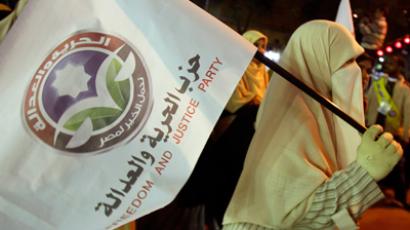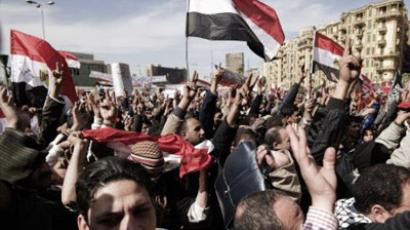Permanent Revolution: Resistance lives among disillusioned Egyptians
A year after a historic referendum that paved the way for a reshuffle of power in Egypt, ordinary citizens worry the change they had been hoping for never happened.
The ruling Supreme Council of the Armed Forces (SCAF) replaced Hosni Mubarak, whom Egyptians accused of corruption, nepotism, economic mismanagement and human rights abuses.But a thorough look at SCAF's policies unveils a situation eerily similar to those of Mubarak’s rule – if not worse.“We weren't against Mubarak as a person; we were against the whole system, against oppression and injustice. Although the SCAF said they were pro-revolution, their actions show they're applying thy same techniques used by him (Mubarak),” a Revolution Youth Coalition activist Khaled Telema told RT.Khaled Telema could be a poster boy for Egypt's revolution: young, educated, a TV talk show host and politically active. He was among those whose protests on Tahrir Square toppled the regime of President Mubarak last year. And like many others who were on the streets with him, he doesn't feel things in Egypt have changed for the better since Hosni Mubarak left office.Blogger Hossam El-Hamalawy, an activist of the Revolutionary Socialist Movement, reveals that in the past year alone, more than 13,000 Egyptian citizens have been processed through military tribunals. That figure far exceeds anything done during Mubarak’s 30 year reign.In view of the widely-known and iron clad ruling methods SCAF uses to manage the country, Egypt’s political system is burning with revolutionary fever.“Now you get protests which are suspended with live ammunition instead of rubber bullets, as was the case in the past. You get labor strikers who get referred to military tribunals other than other records,” Hossam El-Hamalawy said.The streets of Cairo, which were teeming with tourists before the revolution, are now considered unsafe even by those who have lived in the Egyptian capital all their lives.“You can't find police in the street. And even if they're there, they don’t really help anyone,” complains political activist Nahla Salem.In her opinion, the police are punishing the people because they were behind the revolution. Salem told RT’s Irina Galushko the police are deliberately ignoring every single crime that's happening.
Disillusioned revolutionaries
Egypt's parliament has just agreed on a panel which will write the country's new constitution and it's already embroiled in controversy.MPs agreed that half of the panel will be chosen from within Parliament, where the Muslim Brotherhood has a majority of seats.Human rights activists are reportedly calling on the military rulers to dissolve the newly elected commission, saying it has been hijacked by the Muslim Brotherhood who is trying to use the process as a power grab.
The Islamist-dominated parliament agreed that its own lawmakers will make up half of those tasked with writing the country's new constitution, putting Egypt in a very difficult situation.“The new constitution will be written representing essentially one view,” warned Dr. Jamal Sultan from the Al-Ahram Center of Political and Strategic Studies in Cairo.Marged Botros, a professor of political science at Helwan University, told RT that it is totally legitimate for Islamists to put together the constitution – as they were chosen by the people to do so. On the other hand, he said, there are liberals who cite the constitutional declaration, stating that the constitution should be put together by the panel of one hundred members representing all political streams of the nation.Botros believes that no matter who rules, the number one priority for the ruling party should be the country`s economy. “All the parties are struggling to get a larger portion of an unbaked cake… and the cake is not very tasty because the economy is suffering from a big crisis now.”
Some believe the revolutionary parties have chosen to turn their backs on the military council’s questionable policies, having become seemingly comfortable with the way things are.“A lot of revolutionary forces sided with the military council and started making deals and forming a coalition, which gave them more ground, and ignored the main demands of the revolution,” activist Khaled Telema said, explaining that most of the political elite and revolutionaries are looking at fixing things, not changing them.A real possibility now is the revolution is entering a second stage, this time prompted not just by the young and the educated, but by the poor and the unemployed whose numbers have been steadily rising since the military council came to power.Political activist Nahla Salem predicted that the people who simply cannot afford to feed their families these days are really going to lead the second wave of revolution, “and it's going to be very aggressive, and really very violent and bloody.” Today Tahrir Square is filled with a few tents, souvenir vendors and idle youth. But every now and then, things get heated up again. For those who spent their days and nights here bringing down the regime of President Mubarak, they say their work, and the revolution, is far from over.














